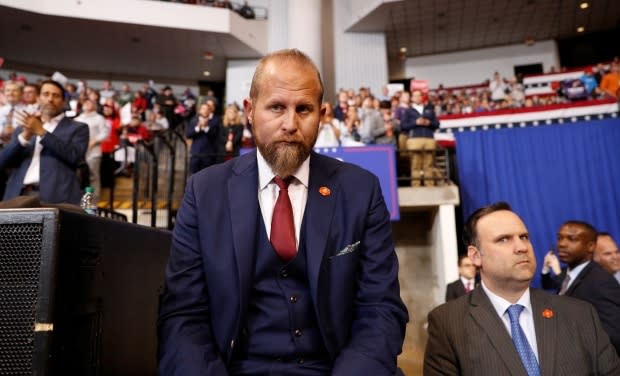Trump's enthusiasm advantage meets fear and loathing on the campaign trail
If there was any doubt that June was a miserable month for Donald Trump — thousands more COVID-19 deaths, racial strife, tumbling support in the polls — his campaign manager appeared only to confirm it with an op-ed in the Washington Post this week that gamely tried to argue the president's re-election prospects aren't as bad as they plainly are.
Under the headline "Trump is beating Biden on the most important factor in this campaign," Brad Parscale breezed past the recent flood of opinion polls that show the president losing to Democratic challenger Joe Biden — nationally and in the battleground states — and instead asserted that Trump has something that will count for more on election day, something almost magical: an enthusiasm advantage.
"President Trump is dominating," Parscale wrote. "The unprecedented enthusiasm behind the president's re-election efforts stands in stark contrast to the flat, almost nonexistent enthusiasm for Biden."
Corey Lewandowski, one of Trump's 2016 campaign managers, chimed in on the same day with the same pitch at Realclearpolitics.com.
"President Trump continues to draw huge ratings and massive enthusiasm, while Democratic presumptive nominee and 44-year career politician Joe Biden remains hidden away in his basement," he wrote.

It's true the enthusiasm of his devotees is vital to Trump's re-election strategy. He has aimed to keep that enthusiasm as close to fever pitch as possible with inflammatory and divisive rhetoric about his political opponents.
His speech to supporters at Mount Rushmore on the eve of Independence Day was typical. He characterized the movement to remove statues honouring Confederate soldiers from the Civil War as a "merciless campaign to wipe out our history, defame our heroes, erase our values and indoctrinate our children." He called protesters who took to the streets after the police killing of George Floyd "angry mobs" trying to "tear down statues of our founders, deface our most sacred memorials and unleash a wave of violent crime in our cities."
Rather than persuading voters to join his base, Trump has always focused on turning out millions of people who are already wild about him but who didn't show up to vote in 2016. Whether there are enough of those people to turn the election for him is a separate question.
But another question is whether the so-called Biden/Trump enthusiasm gap really matters anyway. The more important gap might have nothing to do with Biden at all. It might simply be the gap between the emotional intensity of those who love Trump and those who loathe him.
Pew Research, for instance, found 67 per cent of Biden supporters said their choice was more a vote against Trump than a vote for Biden. Trump supporters told Pew their choice was more for Trump (76 per cent) than against Biden.

But Pew also noted that "while Biden supporters have more mixed views of their own candidate, their views of Trump's presidency are more united and intensely negative." That's both inconvenient for the Trump strategy and entirely consistent with how U.S. politics is evolving: Negative partisanship drives voters.
In his recent book Why We're Polarized, American journalist Ezra Klein describes negative partisanship as "partisan behaviour driven not by positive feelings toward the party you support but by negative feelings toward the party you oppose."
And he describes the evolution of negative partisanship over the past 50 years this way: "We became more consistent in the party we vote for not because we came to like our party more — indeed, we've come to like the parties we vote for less — but because we came to dislike the opposing party more. Even as hope and change sputter, fear and loathing proceed."
Thus, the fear and loathing gap might be the one that should really worry Trump. A Bloomberg poll in April suggested that among voters who dislike both Trump and Biden ("double haters," the Trump team calls them) Biden has a 50 point lead. In 2016, Trump won the double haters over Hillary Clinton.
Polling analyst Rachel Bitecofer factored negative partisanship into her forecasting model a year ago, before the Democratic primary, and the model spit out a Democrat winning the White House no matter who it was.
Of course, there are caveats
So, it's somewhat ironic that Trump, who has been a master of negative partisanship through his crusades against immigrants, the media, the deep state, et cetera, might suddenly find himself running a deficit on the grievance politics ledger because so many people so deeply dislike him.
Lately, it's been going even worse for the president. Polls suggest voters' main concern is the pandemic, and Trump has struggled to find a way to convincingly demonstrate he can manage a national response to the crisis. His daily coronavirus briefings, designed to showcase his command of the file and keep him in touch with his followers, were abruptly cancelled when his staff realized they were such disastrous displays of ignorance and self-harm that they couldn't continue.

Still, all the usual caveats about the election still being months away apply, because the enduring lesson of 2016 is that Trump can survive what to anyone else would seem an utterly barren political landscape.
Plus, there's evidence that even some Democrats worry Biden might not have what it takes to defeat Trump come November. He's been gaffe-prone his whole career, sometimes struggles with sentences in ways that have nothing to do with his stutter, and is even older than Trump, who is the oldest person ever elected president.
But the Biden skeptics might be heartened to know that similar things were said about former Canadian prime minister Jean Chrétien when he returned to politics to take over the Liberal Party almost exactly 30 years ago. He seemed to have lost a step in his time out of politics. He struggled to read a teleprompter, had trouble with syntax, and his caucus was said to be riven with pessimists and doubters who questioned his abilities and stamina for the coming election.
He dismissed them all as "nervous Nellies," and when the election finally arrived, watched as his opponents, a tired Conservative government, obligingly destroyed themselves.


